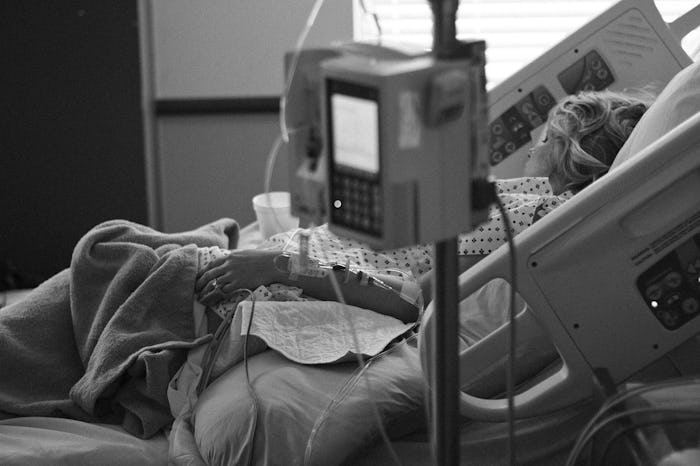Life
7 Maternal Health Issues You Should Definitely Ask Your Doctor About
Pregnancy is, and should be, one of the most exciting and wonderful times in many women's lives. Most moms-to-be only want to daydream about what gender their baby will be, plan nursery decor, and imagine what their little one will look like. No one really wants to think about miscarriage statistics, getting a life-altering test result, or any of the other seemingly countless ways things could go wrong during an otherwise healthy pregnancy. But just because something is scary or negative doesn't mean you should ignore it. As a mom-to-be, there are certain maternal health issues you should ask your doctor about.
Personally, I had a high-risk pregnancy and was constantly worried about all the hypothetical worst case scenarios. But when I finally voiced my million and one concerns to my team of doctors, their answers, advice, and years of experience seriously calmed me down. So even if you're not sure what you should be asking or you're nervous what the answer might actually be to your biggest question, it's definitely in both your and your future baby's best interest to talk to your doctor about any and all maternal health issues. You may not be able to control many aspects of becoming a mother, but you can certainly be informed and educated to take charge of your health and pregnancy.
1Preeclampsia
You may have heard of preeclampsia, or dangerously high blood pressure during pregnancy, and might have even heard a horror story or two from any friends who actually experienced. But what do you need to know about the condition and what should you ask your doctor? Eleni Tsigas, executive director of the Preeclampsia Foundation, told Healthy Women, that you should ask your physician if you might be at a higher risk for the condition and you should watch for excessive swelling and abnormal weight gain.
2Unusual Bleeding
It's entirely normal to be concerned if you see a bit of blood in your underwear, especially if this is your first pregnancy and you're not quite sure what's considered abnormal. The American College of Obstetricians and Gynecologists notes that spotting is completely normal, but adds that excessive or heavy bleeding could be a sign of miscarriage, infection, or even ectopic pregnancy. Definitely check with your doctor if you have any concern about if your bleeding is unusual or not.
3Hyperemesis Gravidarum
If you've ever seen a movie featuring a pregnant woman, then you know that morning sickness is an overused punchline. But when is it more than just your typical pregnancy-related nausea? According to The Hyperemesis Education & Research Foundation, if you are losing weight when you should be gaining it and have severe nausea and vomiting, you should ask your doctor is you have hyperemesis gravidarum. If you have this extreme case of "morning sickness," you may actually require medical intervention to make sure you and your baby are safe and healthy.
4Gestational Diabetes
Although most OB-GYNs will get you tested for gestational diabetes, you could experience symptoms before that. Patricia Devine, M.D., perinatologist at New York-Presbyterian Hospital in New York City, told Parents that urinating more than usual, excessive thirst, and blurred vision can all be signs of gestational diabetes.
5Bacterial Vaginosis
Though it's completely normal to have a change in vaginal discharge when you become pregnant, you should be on the look out for if it could be a sign of infection. Janine Kelback, and obstetric nurse, told Healthline that if your discharge becomes foamy, turns dull gray or white, or if there is an unusual odor, you might have bacterial vaginosis, or BV. This can become a dangerous infection, as it could lead to early delivery or other pregnancy complications.
6Cholestasis
Don't worry if you've never heard of this one. According to the American Pregnancy Association, cholestasis in pregnancy is a liver disease caused by excess pregnancy hormones overloading your gallbladder. This one is quite important to look out for because the main symptom could be easily dismissed: itchy hands and feet. It's important to bring this up to your doctor, as cholestasis could result in pre-term birth.
7Fifth Disease
Though it doesn't always lead to major problems, you should still definitely consult your physician if you notice any of the symptoms for fifth disease, a common childhood illness. According to The March Of Dimes, signs of fifth disease include a rash and flu-like symptoms such as achy joints and a runny nose. Typically a mild illness, it can, however, cause anemia in the baby, miscarriage, and even stillbirth. So definitely bring this up at your next visit if you have any concerns.
As always, if you're experiencing any unusual symptoms during pregnancy or have any concerns, you should contact your OB-GYN immediately. After all, you're health should be their number one priority.
